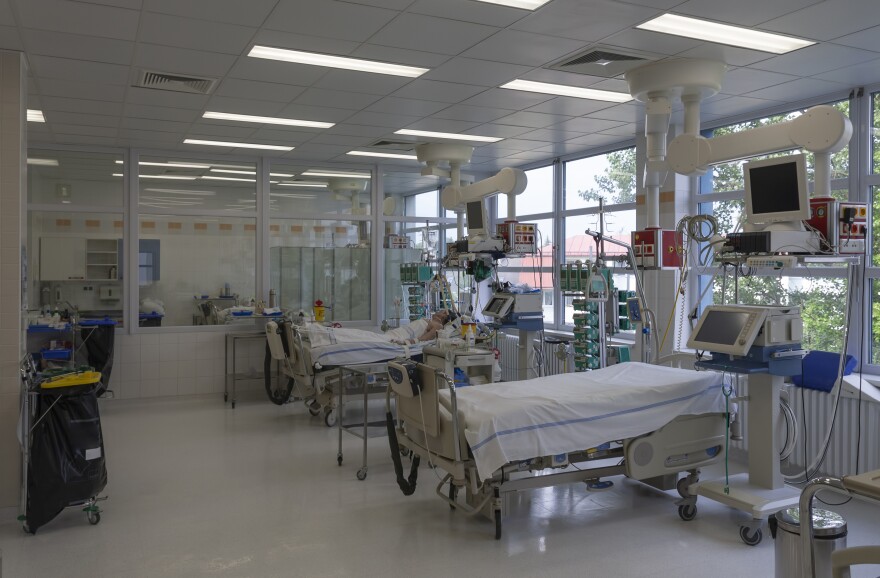A number of major hospital systems across the state are warning they may have to cancel certain medical procedures if coronavirus cases continue to rise.
As of Thursday, the state reported a total of 1,545 people hospitalized with COVID-19, a 47% increase compared to last Monday, when 1,050 people were hospitalized.
The hospitalization numbers are far below what they were during the previous peak of cases in the spring, but the latest surge is happening in different parts of the state. So, while the overall caseload is lower, many individual hospitals and hospital systems are seeing a record-number of COVID-19 patients.
“I would not consider this any longer a surge,” said Eric Pessell, health officer for Calhoun County. “This is an unprecedented spread of the virus in our community.”
"This is a situation that is not sustainable."
Pessell gave an update on the situation during a meeting of the Calhoun County Joint Information Center on Wednesday. During the update, he said local hospitals – including Oaklawn, Bronson Battle Creek and Ascension Borgess, are seeing patient numbers they’ve never seen before.
“This is a situation that is not sustainable,” Pessell said. “We cannot continue on a curve we are under.”
This past week, there were reports of some hospitals in the area diverting emergency patients to other hospitals because they were out of room.
In other parts of West Michigan, the capacity issues seemed less dire, though many hospital leaders said they’re worried that could change.
“We have a significant concern of running out of beds over the next several weeks,” said Dr. Loren Hamel, president of Spectrum Health Lakeland in St. Joseph.
Hamel spoke during a COVID-19 update from the Berrien County Health Department. He said his hospital, like many others, canceled procedures in the spring to make way for an influx of COVID-19 patients. At this point, Hamel says the hospital has a “significant” number of non-COVID-19 patients. And it’s trying to continue to care for those patients while COVID-19 numbers rise.
“If those trends continue,” Hamel said of the rise in coronavirus cases, “it will produce some serious capacity constraints in the health system.”
Dr. Darryl Elmouchi, president of Spectrum Health West Michigan, issued a similar warning to staff in a video update earlier in the week.
It’s not clear when hospitals might have to cancel or postpone other procedures to make way for more COVID-19 patients, but hospital leaders say they’re watching the situation closely.
“Boy, that’s the million dollar question I ask myself every day,” says Dr. Matt Biersack, chief medical officer at Mercy Health Saint Mary’s. “Right now, we’re sitting well in terms of our ability to continue to care for more COVID and non-COVID patients. But certainly when the need arises, we’ve got additional units and beds that we can bring online.”
Biersack and others say people who think they need medical care should still reach out and get that care, regardless of COVID-19 numbers.
"Show your love, share your love, but don't do it too close," says Dr. Loren Hamel, president of Spectrum Health Lakeland.
“I think one of the things that we saw in the spring is that a lot of folks really delayed a lot of important and essential care,” Biersack says. “And that’s something that we’d really like to avoid going forward as we enter our resurgence.”
There is, of course, something people in the community can do to help reduce the burden of that resurgence: Follow the health guidelines for slowing the spread of the virus. Doctors and other public health professionals have been pleading for weeks for more people to observe physical distancing and wear masks at all times indoors. The Michigan Department of Health and Human Services also issued new pandemic orders Thursday to limit the size of gatherings and encourage mask use.
Health officials say it’s especially critical for people to continue to observe those guidelines, even as they gather for upcoming holidays
“I just encourage people, show your love, share your love, but don’t do it too close,” said Dr. Hamel, whose own brother spent weeks in the hospital battling COVID-19 during the spring outbreak. “Sometimes the best way to be loving is to be a little more distant.”






